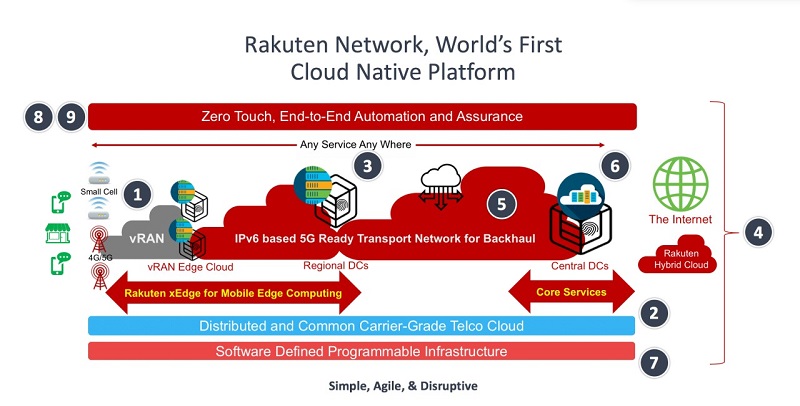Rakuten says it’s on track to launch commercial services on its new mobile network in October, which the Japanese e-commerce giant calls the first end-to-end fully virtualized cloud-native mobile network.
Intel on Thursday announced it’s powering the backbone of the network built to serve millions of customers in Japan, which uses a virtualized radio access network running on Intel Xeon processor-based servers from Quanta, support radio access technology from Altiostar, and core network software from Cisco.
“Intel powers the backbone of our network,” said Tareq Amin, chief technology officer, Rakuten Mobile Network, in a statement. “We believe this full end-to-end virtualized network will help us to shift away from reliance on dedicated hardware and legacy infrastructure. This is a win for customers, too. We will be able to reach new cloud-like operational efficiency, and that passes on cost-savings to our customers as well.”
Rakuten has named a host of other partners including Nokia, Red Hat, OKI, Fujitsu, Ciena, NEC/Netcracker, Qualcomm, Mavenir, Sercomm, Tech Mahindra, Allot, Innoeye, and Viavi—which the company said were brought together to “collaborate on the most challenging technical problems in the mobile industry.”
Rakuten says the network will initially be 4G LTE and WiFi, but adopts 5G systems architecture from launch, with 5G access anticipated in 2020, subject to government licensing approval.
The company plans to offer a variety of services, including consumer mobile services, 5G fixed wireless access, NB-IoT, AR/VR, and rich media.
Rakuten is also leveraging multi-access edge computing (MEC) with Intel to extend its network. The company said its current customer base of more than 100 million registered members provides a strong foundation for growth. Read a network overview here.

(Image Source: Rakuten)
“Our vision is to build a network that innovates at the speed of software and scales at the speed of cloud and, with a culture founded in technical and operational innovation, we are uniquely positioned to achieve that,” Amin said in a news release. “With a keen focus on minimizing complexity and disaggregating hardware and software, we are leveraging best-in-class technology from partners in Japan and around the world to provide a high quality, cost-effective service to our customers.”
In early February, Rakuten announced success of the first end-to-end real world tests of the data network, outside the company’s headquarters in suburban Tokyo.
Rakuten has offered mobile services since 2014 as a virtual operator using Docomo’s network, according to the Japan Times. In August, the outlet reported that Rakuten set a target of 15 million subscribers and plans to cover 96 percent of the population in Japan by 2026.




